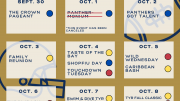Lizandra Portal/Staff Writer
When it comes to textbooks, students can take Jessie J’s advice and forget about the price tag.
“On average, college students spend between $600 and $1,400 on textbooks each year, according to the College Board,” read a press release sent by Media Relations on Friday, Aug. 4, announcing the University’s movement to reduce the cost of books.
The latest measure put in place by FIU to help reduce the cost of textbooks is its partnership with OpenStax Institutional Partnership Programs, which encourages the creation of use of free, peer-reviewed, open source textbooks. FIU is one of 11 universities invited to participate in this strategic partnership in 2017-2018.
“At FIU, we are concerned about costs because so many of our students are first generation college students and come from families of modest means,” President Mark B. Rosenberg said in the press release.
Additionally, programs like price matching, which is available at both the Biscayne Bay and Modesto Maidique campuses Barnes & Noble, is another method the University uses to help students afford textbooks.
“Our Price Match Program is just the latest example of our commitment to student success, ensuring that students get the best prices available on their course materials by providing price matching on textbooks advertised or offered from local brick-and-mortar bookstores or online retailers (i.e., Amazon or BN.com),” said Mike Comiskey, the MMC’s Barnes & Noble manager in an email to Student Media.
However, the program does not include online marketplaces like “other sellers” on Amazon and BN.com Marketplace, or peer-to-peer pricing, according to Comiskey. Students will be unable to price match textbooks unless they are directly sold by Amazon or BN.com.
Price matching doesn’t just save students money, according to Erica Garvey, the store manager for BBC’s Barnes & Noble, but it also saves them time.
“We may have the book for, let’s say $50, and you may go to one of those [bookselling] sites and they are offering the book, same exact book in the same used condition and it may be $10 less,” Garvey said. “It’s a saving, but they get the book right away from us with no shipping charge.”
Ricardo Rios, a senior psychology major, registered for a class late and needed a book right away, so he took advantage of the price match program and rented the class textbook for a cheaper price. In essence, Rios explained that in essence, time is money.
“Instead of waiting for it to come in the mail, or paying extra for it for next day shipping, I was able to… walk out of the bookstore with my book that day,” Rios said.
Renting instead of buying is another way students can save money when it comes to textbooks.
“I used to buy all of my textbooks,” said Alexandra Rodriguez, a senior journalism major. She has tried selling a stack of textbooks she has at home, but it’s proven more difficult to sell them because “you have to find reputable places…who’s going to give you more money for the textbooks and some textbooks aren’t worth anything anymore.”
But, the FIU bookstores also have a buyback program for students looking to get rid of old textbooks.
“If the book is being reused for the next semester…we would typically buy it back at half price, half of new or half of used,” Garvey said. “Or if we are not buying for ourselves, we also buy back for national wholesale companies.”
According to Comiskey, the number one priority for the FIU bookstores is to help students find the course materials they need to succeed at the most affordable prices. This would include access codes and e-textbook packages.
“Sometimes professors will order a textbook packaged with an access code,” Garvey said. “Typically, the publisher will sell us an access code as a stand-alone code, but they come with an e-Textbook attached.”
The benefits of these access code packages depend on the preference of the students, according to Garvey. Some students prefer a physical copy of the textbook, while others may not mind just an e-textbook.
While some students know how to get books at a cheaper price through the bookstores’ benefits, many incoming freshmen rush to purchase their textbooks before classes start.
“That’s a rookie mistake,” Rios said. “I always wait at least a week or so into the class to really determine… if the book is required. You’d be surprised how many classes really don’t need textbooks.”
The bookstore at BBC is open Monday through Thursday from 8:30 a.m.- 8 p.m., Friday from 8:30 a.m.- 5 p.m. and Saturday from 10 a.m.- 2 p.m. for the first week of school. The MMC bookstore is open Monday through Friday from 8 a.m.- 8:30 p.m., Friday from 8 a.m.- 6 p.m. and Saturday from 10 a.m.- 3 p.m.






Be the first to comment on "University works to reduce financial strain of textbook costs for students"